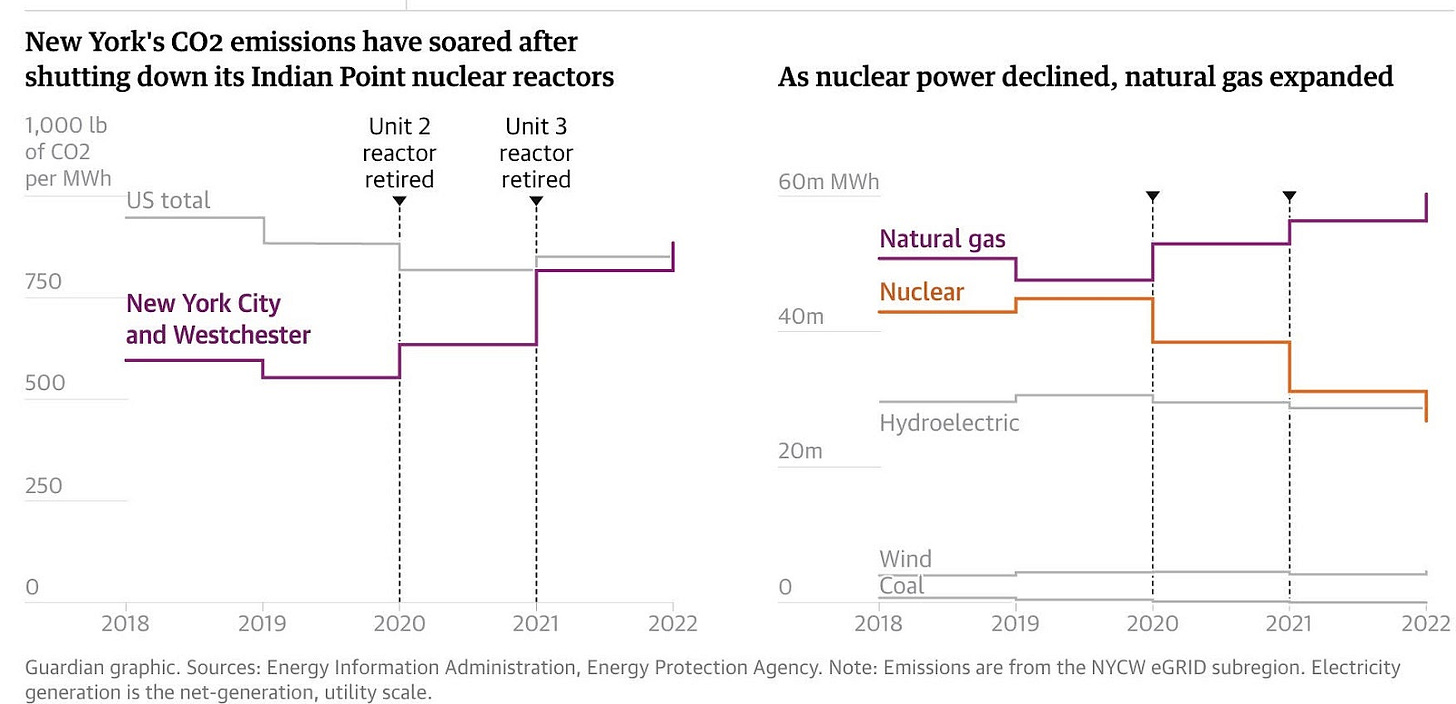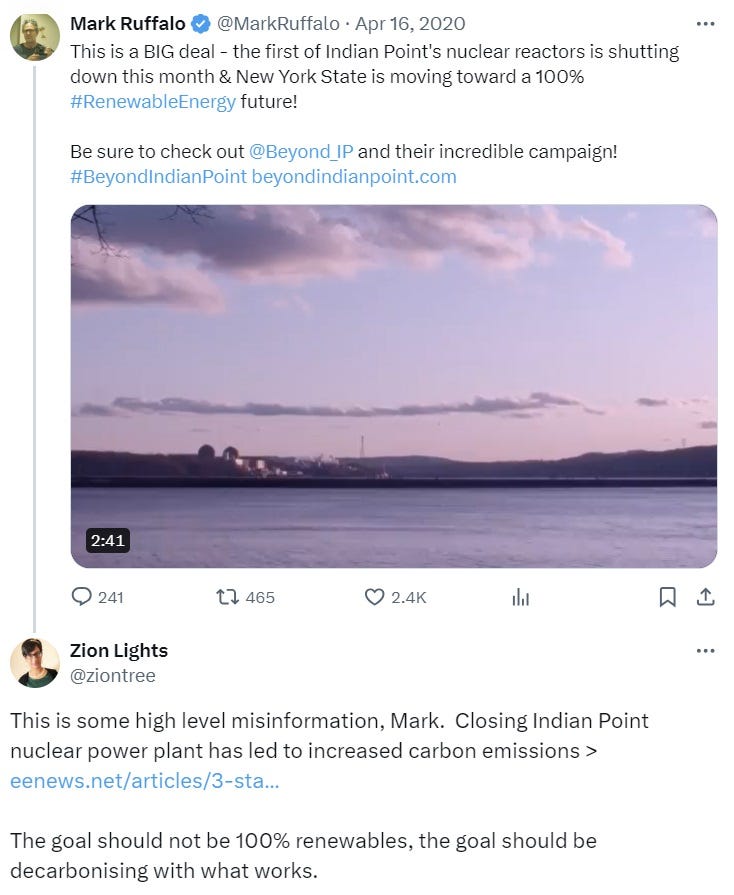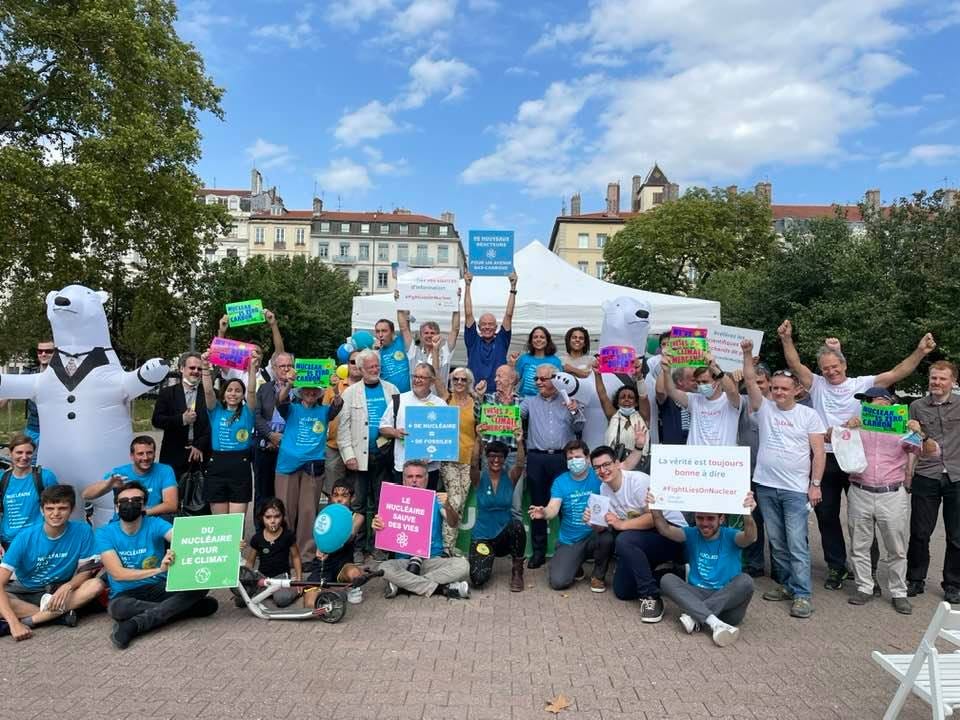Nuclear phase-outs increase dependence on fossil fuels. Journalists should stop acting surprised
Anti-nuclearism has never been about environmentalism or following the science
“Si vis pacem, para bellum” - Latin adage
Translation: "If you want peace, prepare for war"
What would you say if I told you that a global empire with a turnover of hundreds of millions of dollars lobbies heavily against life-saving technologies like nuclear energy and gene-editing?
That’s a headline you won’t read today.
If a corporation did this, it would be front-page news. Activists would be up in arms against the nefarious antics of ‘The Man.’ But this empire has cleverly branded itself as a helpful, environmentally friendly organisation. Its name? Greenpeace, Friends of the Earth, WWF, the Sierra Club, and the Natural Resources Defense Council, to give a few examples. Some of these organisations have been financed by vested interests, which I wrote about two years ago:
In 1969 Big Oil gave a founding donation of $200,000 to start an environmental group called Friends of the Earth set up to oppose nuclear energy. This start-up money was provided by the owner of Atlantic Richfield Oil Company. One of FoE’s first major campaigns was to protest against nuclear power.
Other major NGOs, like Greenpeace, have long lobbied against nuclear energy all over the world. Greenpeace’s Battle of Grids strategy proposes gradual replacement of nuclear power by fossil gas plants to provide ‘flexible backup for wind and solar power’. The NGO has its own energy company, which is misleadingly named ‘ProWindGas’, while actually selling 99% gas to consumers.
‘System change, not climate change’
The most significant success of the anti-nuclear movement has been branding itself as a friendly, tree-hugging environmental cause when this couldn’t be further from the truth.
I have written about my experience in the hippy movement, which I joined because I wanted to help make the world a better place, only to find that my ambitions were not aligned with the broader hippy cause. Since leaving the activist organisation Extinction Rebellion, I have spoken openly and widely about my former activist colleagues’ ambitions to bring about a political revolution under the guise of climate action, and people are generally now more aware of the motivations of some of these organisations.
Unfortunately, these anti-human activists have given environmentalism a bad name. Many of us genuinely care about issues like clean air, reducing emissions, and conservation issues, but we also believe in doing this in an evidence-led manner. But our arguments get little coverage, while the ill-informed anti-nuclear activists still represent standard of what it means to be an environmentalist in the press and beyond.
The legacy media has yet to catch on. A journalist at The Guardian has responded with surprise that when Indian Point nuclear power plant was shut down it was replaced by gas. But this is almost always the case when nuclear reactors are shut down: fossil fuels fill the gap, not ‘renewables’, no matter how much anti-nuclear activists promise the opposite (see Germany as the most relevant and recent case study). This isn’t new information.
The problem with this reporting is that it assumes that no one knew this would happen. It questions whether shutting down nuclear reactors is a good idea as if there has suddenly been a revelation among its writers. But many of us knew this would happen, and have been saying so loudly, since it has happened many times before (again, look at Germany). It just didn’t get as much coverage as the other side.
We have even pointed it out to some of the most vocal and influential anti-nuclear activists, like the actor Mark Ruffalo:
Take a moment to appreciate the irony that the actor who played the superhero The Incredible Hulk in the Marvel franchise has been at the forefront of lobbying against Indian Point - a heavy dose of gamma radiation created the Hulk’s superpower.
More dangerously, Ruffalo spreads misinformation that gas and nuclear energy cannot act as ‘bridge fuels’, as does WWF and other NGOs. This is contrary to what data shows: according to Dr Fatih Birol, Executive Director of the International Energy Agency (IEA), “Natural gas is one of the mainstays of global energy. Where it replaces more polluting fuels, it improves air quality and limits emissions of carbon dioxide.”
Full of gas

Crucially, journalists are missing the fact that many anti-nuclear activists purport to be against gas in this manner, but actually prefer gas to nuclear energy. This doublespeak unsurprising to anyone who has been paying attention. Greenpeace has been paramount in spreading misinformation about nuclear energy, but the organisation also founded what it branded as a ‘renewable’ energy company selling the aforementioned ‘proWindgas’. Since I started pointing this out, the original webpage for proWindgas has mysteriously disappeared. Meanwhile, Greenpeace filed a lawsuit against the European Commission for including gas and nuclear in the EU taxonomy. Apparently, misleading branding is only acceptable if they’re doing it. You couldn’t make this stuff up.
Selling clean energy as ‘renewable’ when it is mostly gas should be problematic for an NGO that claims to fight against fossil fuels, including gas. Again, if a corporation was doing this, they’d be held accountable by activists and the media.
Anti-nuclearism is not the same as environmentalism. Journalists need to catch up with the real story and stop conflating the two.
Voices of nuclear
Why has it taken the world so long to embrace the clean and reliable energy that is nuclear power? Many early voices were targeted and silenced by the anti-nuclear empire. Those of us who stayed in the fight have scars on our backs from it. These large, powerful, influential and well-funded organisations repeatedly launch ad hominem attacks against anyone who challenges them (including yours truly) to bully them off the scene.
Think I’m exaggerating? Consider the curious tale of Stanford University Professor Mark Jacobson, who sued critics of his work for $10 million on the grounds of defamation because they found that his figures purporting that a 100% renewable-powered world is possible were wrong. Jacobson later dropped the lawsuit to avoid paying defendants over $500,000 in legal fees. His paper received ample mainstream news coverage, but the debunking of his assertions did not go viral.
In a similar vein, French former Minister of the Environment Corinne Lepage is suing founder of Voices of Nuclear Myrto Tripathi over a tweet in which Tripathi tagged Lepage in a ‘hall of shame’ of people due to whom ‘millions would die over their hatred of nuclear energy.’ Although this tweet was only seen by a few people, and is arguably true since Lepage has campaigned against nuclear energy, Lepage argues that the tweet has tarnished her reputation, and is demanding 20,000 euros in damages. The hearing is set for 4 April.
Sadly, wealthy activists continue to undermine measures to eradicate poverty, as demonstrated by Ruffalo’s argument that gas is not a bridge fuel. In lower-income countries, gas is a lifeline, as it is needed to transition away from dirtier fuels like wood and coal. It’s beneficial for people and the environment when gas replaces coal, but gas replacing nuclear energy is a downgrade. For the rest of the world, investing in nuclear energy is realistically the only way to decarbonise, as there is evidence that it works, while aiming for 100% renewables is based on thoughts and prayers and has repeatedly failed where it has been attempted, and not for lack of investment (again, see Germany).
Nevertheless, we soldier on. We continue to counter misinformation because we understand what’s at stake, can see the bigger picture, and because it’s the right thing to do. We don’t have the positive branding or funding that large NGOs have - quite the opposite, as most of us are not paid by large organisations to do this work and are used to being demonised for our work in this space.
Thankfully, despite bullying and underhand tactics, in just the last few years, the rallying cry for clean energy has been adopted by people from all vocations, including previously anti-nuclear activists, actors, models, influencers, doctors, brilliant science communicators like Jim Al-Khalili, Kyle Hill, and Sabine Hossenfelder, and even the latest Miss America.
Because of this turning of the tide, some people assume the battle has been won in favour of nuclear energy, but the legacy of the anti-nuclear movement remains in the form of over-regulation of nuclear power plants and continued closures of operating nuclear sites. The bad actors have not disappeared. As I write this, Greenpeace is protesting the first nuclear energy summit, which is being held in Brussels. Their influence is prolific: even Belgium, home of the Atomium, plans to phase out its nuclear fleet by 2025.

The lasting legacy of anti-nuclear activists posing as climate warriors has caused significant harm to people and the planet. Campaigning against clean energy has resulted in negative human health implications and avoidable deaths when we should have instead achieved better air quality. Anti-science activists have contributed to the continued blindness and high mortality rates of vitamin-A-deficient children in lower-income countries who, with the aid of gene-editing, should instead be able to lead normal lives. Traditional environmentalism has resulted in the sterilisation of millions of Indian people in the name of so-called ‘overpopulation’. Crucially, anti-nuclearism has resulted in increased emissions when we should have seen decreases. These activists have, arguably, worsened climate change - the very cause they claim to care about. Some people just want to watch the world burn.
I am hesitant to say that pro-nuclear advocates are the real environmentalists, because the term ‘pro-nuclear’ itself needs reframing so that terminology stops working in favour of those who tell mistruths. But semantics are only part of the battle. To my knowledge, no one has been sued for claiming that wind and solar power can fully replace nuclear energy. As long as countries continue to shut down nuclear reactors, large organisations and interests keep spreading lies about nuclear energy, and journalists continue to act surprised when fossil fuels replace nuclear power plants because the myth of 100% renewables continues to prevail, the battle has yet to be won. That’s the frank truth. Let’s hope I don’t get sued for saying it.









My dad was one of them. Somewhere I have a drawing from the early 1970's (possibly from Friends of the Earth) viciously lampooning him for claiming that nuclear power would address CO2. Of course nowadays everyone is nastier and more prolific.
Lots of good information in here that the average person normally never sees.